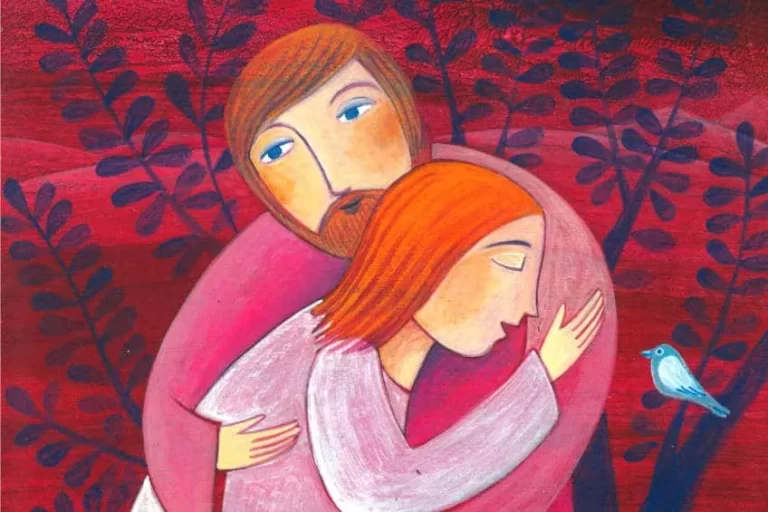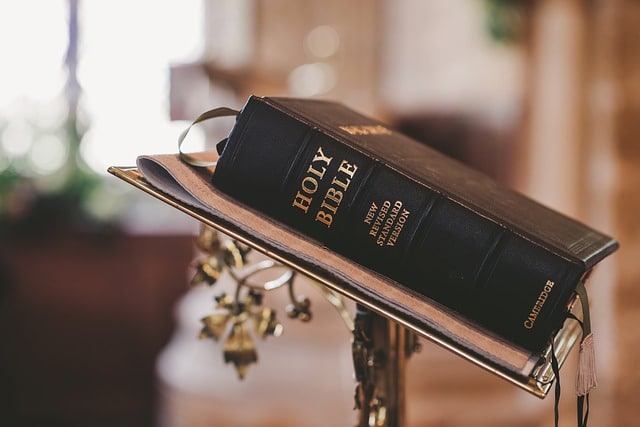How to study the bible for a good Christian benefit?
How to study the bible ? This is the question that Christians and people who want to know about God ask themselves. If you want to know why the Bible is so important, how you can learn from it, whether it is reliable or not, you definitely have to read this article.
How to study the bible?
How to study the bible ? It will be a question of the past, because here we will explain step by step how you can study it, what techniques allow you to better understand it and how you can get the most out of this guide from God for your spiritual growth.
Obviously, we have all heard that we should read the Bible, that the word of God is contained in it, that the Bible is the path that God has left us traced so that we follow him and live according to his will, but how to study the bible ?
The million dollar question, how to study the Catholic Bible ? Studying the Bible should not be a reading by obligation or without the intention of learning, but rather a deep, reflective reading that allows us to learn from it, from the life of Jesus and to be able to follow his example.
How to study the bible ? Simple, disposing ourselves and dedicating time to God and to ourselves for it, to get to know him more every day, to listen to his word and find the strength we need in times of difficulty or when we do not find clarity.
There are many methods that help us understand how to study the Christian Bible and not die trying. We will explain each of them step by step later and with the care and importance that each one deserves.
The opinions on How to study the bible ? They are very varied, so in this article we will share a complete guide with various methods so that according to them you can decide which is the best option for you.
In reality, there is no “correct” way to read the Bible, as we mentioned before, we must do it as best suits us, as we feel comfortable and allows us to learn about our Master Jesus and grow spiritually.
So before the question How to study the Bible ? Just keep in mind that it is a book without instructions, it does not tell us where to start but without a doubt you have to read it all and with the care and importance it deserves.
If you have never read the Bible or are new to the faith, one of the best ways you can study the Bible is to start with the New Testament. Perhaps, you have heard some verses from the Bible, you have heard songs, and it has begun to attract your attention to know Jesus and his word.
Obviously, this new seed of curiosity that is growing is accompanied by the question: How to study the Bible ? As we mentioned, one of the easiest ways if you have never read it is to start with the new testament, but what is the reason?
When we start with the New Testament, the first thing we are going to find is the book of Matthew, which tells us about the genealogy of Jesus, what is its origin? How was his birth? What is his ministry and his gospel?
That is, the belief of every good Christian, of all the children of God, what is the foundation of their faith. It also reveals to us, how Jesus and the Father love us infinitely and that despite being sinners, God the Father sent us his son to die for you, for me and for each one of the men on earth. to save us.
Thanks to that sacrifice and the demonstration of his power even in the face of death itself, Jesus has saved us and has promised eternal life to all of us who believe in him, in his word, in his life, in his death and in his resurrection.
Now, we have the option to be able to save ourselves, not to be condemned for all eternity, but rather to enjoy an eternal life with our Father, an eternal life full of joy, happiness and love for all eternity.
So how do you study the Bible ? From the beginning, knowing Jesus, his life, work and word of him. Understanding that he loves us infinitely and is merciful and that we can always redeem ourselves, ask forgiveness for our sins, be forgiven and received with open arms on the day of our death.
What good news to know that God is always with us, that he does not abandon us and that no matter our sins or mistakes of the past, God offers us to change, follow his example and have a completely different life, a new life.
God, through the Holy Spirit, allows us to constantly renew ourselves, allows us to have an intimate communication with him, ask him for forgiveness, just as we do with our parents here on earth, and just like them, he always forgives us and lovingly receives us.
In conclusion, how to study the bible ? From Matthew to Revelation, because the first books of the New Testament are the gospels and they tell us about the gospel of the life of Jesus, but obviously from different perspectives because they are narrated by different authors.
Of course, each author adds his personal touch, his perspective, and that is what makes the Bible so rich and delicious to read. Some people also often note the differences and similarities between each of these stories, leaving us wanting more and learning more about Jesus.
To study the Bible, all we need is the willingness to understand it in depth, to spend enough time reading it over and over again to understand something different in each new reading.
What is the bible?
Before starting to develop in depth How to study the Bible ? It is important to understand what is the Bible?
The Bible is one of the most influential books in history, so much so that it is considered a holy book. The Bible explores great questions, for example, why do we exist or what is our origin?
The Holy Bible has inspired many people to do amazing things and has confused many others. Probably, in your house or in a friend’s house you have kept one there and the question arose: How to study the Bible ?
The Bible has sixty-six (66) books and is divided into two: Old Testament (before Jesus) and New Testament (after Jesus).
The Old Testament tells us about creation, how was the people of Israel chosen? He also tells us about the works and prophecies of Jesus that are yet to come, people who descend from the lineage of Jesus, his ancestors.
Also, the old testament is full of psalms, proverbs and historical facts, to put it in a simpler way. On the other hand, the new testament tells us mainly about the life of the Master Jesus.
The New Testament shows us prophecies that have been fulfilled, as well as some that have not yet been fulfilled but that will undoubtedly be fulfilled, since they are the word of God. And it tells us about his life, his ministry, his death and resurrection, what happened after Jesus and what is to come?
Do you know why God is merciful and kind? Because he is our Father, because he loves us, because even when he tests us he does not do it for evil, but so that we learn and become stronger, so that we show him our love and devotion.
God, it is the way to stop being tied to our past, thanks to him, we have the opportunity to emerge, to be happy, to live fully and not chained to our mistakes or our sins, and that is news that we must share. with joy
Thanks to the sacrifice of our beloved Jesus, we can now restore ourselves, heal our wounds, enjoy a new heart and communion with our God the Father and the opportunity for a new life, and we can discover all of this through the Holy Bible, through the word of God.
Psalms that tell us about the Bible
There are various psalms that tell us about the Bible, the word of God and about his pure word, that these teachings and messages cannot and should not be modified by any man.
Rather, the teachings of God are to be upheld and professed from generation to generation. Among them, we can highlight:
- Salmo 12:6
- Salmo 18:30
- Salmo 119:89
- Mateo 4:4
- Juan 10:35
These psalms also tell us that the word of God must be obeyed, not be broken under any circumstances and that they are also our food for the soul.
Just as we feed our body to keep it healthy, strong and functioning properly, we must also feed our spirit, because God asks us to keep our faith strong and the best way to do it is through his holy word.
The Old and New Testament
The Bible is actually a small library of books that all arose from the ancient people of Israel, and in a certain sense, they were like any other ancient civilization, however, among them, there were some “special” people known as prophets.
These prophets did not see the history of the people of Israel as ordinary, but rather as extraordinary, as an essential part of what God was doing for all humanity, in addition, these prophets wrote fantastic stories in Hebrew.
They were masters of metaphor and narrative, so they used these techniques to explore the most complicated questions of life, about death and life and the constant struggles as human beings, which is why there are diversities of authors in the Bible .
The impressive thing is not the stories in the texts, but rather that they were written over a period of a thousand years, so there was no way for them to know their respective narratives and even so, many of their stories have things in common.
It begins with Israel’s origins in Egypt, its kingdom, and later, its first temple. These were conquered by the Babylonians and were exiled. Later, many of the Israelites returned to their respective towns and began to build their own temples.
With these “second temples” they began to reform their identity and it is at this point that the Jewish scriptures began to take shape as we know them today. So the Jewish bible, what’s in it?
In Hebrew it is known under the acronym Tanak, “Ta”, from torak, sometimes known as “the law”, it includes the first five books with the history of the birth of Israel: Genesis, Exodus, Leviticus, Numbers and Deuteronomy.
For its part, the letter “N” stands for Nevi’im, a Hebrew word that translates as “Prophet”. This section contains the historical books that tell the story of Israel from the point of view of each of the different prophets: Joseph, Samuel, Laws.
And then, it contains the same poetic books of the same prophets: Isaiah, Jeremiah, among others.
Finally, “Ak” stands for Ketuvim, a Hebrew word that translated means “scripture” and contains a diverse collection of poetic books, wisdom books, and grand narrative books: Psalms, Proverbs, Job, Ruth, Chronicles, among others.
Second Temple literary works
The Jewish people believe that through all these literary works God communicates with us. Also, there were a lot of other literary works being produced during the “second temple” period and a really diverse set of texts.
These literary works (Maccabees, Tobias, Judith, Wisdom, Sirácides, among others) were also highly valued by the different Jewish communities, which in turn generated a great debate in these ancient times.
Many wondered whether or not these texts should be included as part of the scriptures contained in the Holy Bible, so we can say that there are various types of texts written over a fairly long period of time.
When we ask ourselves how to study the bible ? And we begin to read from the New Testament, we then begin to know Jesus, his word, his apostles and some prophecies of the Old Testament, so little by little we can connect the dots and better understand everything.
It is important to note that the Bible has been written by many people and also at different times, which were later brought together in a single text, which resulted in “The Holy Bible”.
The New Testament also tells us about the end times, about the events prior to those last days. After you have read the New Testament, go back to the Old Testament and simultaneously read the New Testament again, this will give you a new perspective and help you better understand each event.
What does the bible that we know today contain?
After the New Testament, at the end of the Gospels, he tells us about the letters that the apostles wrote to the first Churches and were the ones who somehow founded the foundations of Christianity as we know it today.
After the coming of Jesus, Christianity arrives, and with it, a kind of “special access” in which anyone can start when they want to know God, converse with him, and it is not exclusive to the Israelites.
The million dollar question is: why did they put the books together the way they did? Because each one of them costs quite an epic story, in which he shows us in various ways how God works to bring order and beauty to the chaos of our world.
All this chaos is said to end with the arrival of a leader, a messiah, who would come to transform us from the heart and renew our lives and all creation, however, the tanak ends and this “leader” never came.
Centuries later, a prophet named Jesus of Nazareth enters the scene and claims that he was continuing the unfinished story of the tanak, so he performed miracles and shared his teachings, finally dying on the cross.
His followers affirmed that Jesus had risen from the dead and that in reality, he was that leader, that messiah whom everyone had heard and waited for centuries with great faith and devotion, so his first followers, the apostles, they wrote and included new literary works about Jesus, his life, works and teachings.
They called these works “good news” or gospels, and even made up a book called “Acts”, which tells us about how the Jesus movement spread throughout Israel and beyond. Subsequently, they shared letters to the different communities of Jesus throughout the ancient world.
The apostles considered these writings and letters as part of the sacred scriptures and wrote all this as the fulfillment of this epic story that we find in the “Tanak”, and also, they were continuing the story that centuries ago had remained unfinished.
With the literary genius of the Jewish tradition, they also believed that it was a way for God to communicate with his people through these texts, as well as through the writings of Israel, so this is a small summary of everything we can found in the Old and New Testaments.
However, there were some differences of opinion regarding these books, so we can say that there is the tanak or Old Testament (Aramaic and Hebrew), we have other works of the second time (Greek and Hebrew) and finally, the writings of the apostles (Greek) or New Testament on the life of Jesus.
Obviously, this is too much literature, so what is really in the Bible that we know today?
For more than two (2000) thousand years the Christian movement has taken different forms and paths, however, since the beginning, all Christians know both the tanak and the New Testament scriptures.
That is why, for centuries, much of the literature contained in the second temple period was contained in the biblical tradition. The Catholic Church, for example, eventually made it official and called some of the books in this collection “Deutero-canonical books.”
Some Orthodox Churches used even more books of Second Temple literature. Then, in the 16th century during the reformation, the Protestant Christians wanted to go back to the older scriptures of the prophets and apostles, so they accepted only the Old and New Testaments.
Can we trust what the Bible says?
The answer is yes and there are thousands of evidences that prove it, but without a doubt the most true proof that we can fully trust everything the Bible says is that it is inspired by the Holy Spirit.
What does it mean that the Bible is inspired by the Holy Spirit? That many people wrote it at different times, and not only that, but many people already preached his word before the arrival of Jesus.
Obviously, the first Christians who read the Bible could affirm, and even attest, that what these scriptures contained were true, but after centuries, in these modern times doubt can arise.
Therefore, below, we will share three irrefutable reasons, which confirm that the Bible is absolutely real and reliable.
Evidence that the Bible is reliable
As we mentioned before, there are three tests that are irrefutable and that strengthen the faith of every Christian or person who wishes to learn about God.
- The number of texts or manuscripts
- The quality of said texts or manuscripts
- The time interval between the earliest known texts or “original texts” and the most recent.
Despite the time lapse, they have many stories in common, how can this be explained? Only in one way: they were inspired by the holy spirit and therefore are true and reliable.
About the translations
Very few can say that they know how to read Greek or Hebrew, so perhaps this can generate some doubts about whether or not the translations are reliable at all, however, the most important thing is to have the willingness to learn about God and his word.
ways to study the bible
As we mentioned at the beginning of this article, there are several ways to understand how to study the Bible ? Next, we explain some methods that may be of interest to you.
Something that we must always keep in mind is that the Bible should not be read only, but understood, read in depth and thoughtfully, as well as put into practice each of its learnings.
It is not about reading and professing, but about applying it in our lives, it is a theory put into practice, to put it more simply.
The objective of studying the Holy Bible is and should be to listen to God, internalize the messages that he wants to convey to us in each text and understand the context in which it is expressed.
If you have wondered how to study the bible ? then don’t worry, we will share various methods to do it.
General strategy
This first method is quite simple but it does not stop being effective. You just have to follow the following steps:
Study plan
Start by creating a study plan, that is, establishing a specific time, place and days for it. You can use a calendar if you prefer so that you plan much better and nothing interrupts that moment between God and you.
To make the study of the Bible much more effective, we recommend that you have a diary, it can be a notebook that you dedicate to it and write down everything that seems important to you: psalms, verses, stories, words that you do not understand, and even doubts.
This will serve as a personal record and will make the study much more dynamic, generating in you that feeling of continuing to learn more every day, knowing more about Jesus, his life and the love of him and his Father for his children.
get a bible
Of course, we must have our own Bible so that we can take it with us wherever we want and be able to read it or even find the right words in it.
The Bible is a sacred, wonderful book, in which it does not matter if you do not know it yet, wherever you open it God has a message for you, for that circumstance you are going through.
Important, before choosing any Bible let’s be careful. Let’s avoid Bibles that have not been translated from Hebrew or Greek, since these are the original languages. Those translated directly from Latin are not as reliable at the translation level.
Another recommendation is to make sure that we have fully understood God’s plan, each passage, each word, in addition to verifying that it is correct.
For example, if there is a verse, passage, psalm or any other that has caught our attention, let’s first check on the internet that the translation is correct and that it is the same message.
Study the Bible prayerfully
Just as we discipline ourselves in prayer, in communicating with God, so should our Bible reading, reading, prayer, and practice. A daily task, a new habit incorporated into our lives. Ask God to allow you to understand his word, his message, to give you the wisdom to understand him.
Start with the New Testament
We have already explained why. First, we must know his life, his work and words, to then understand the reason for each of the circumstances and people involved in each story, in each fact.
Start by reading John
Within the new testament it begins with the book of John, this is the easiest gospel to read if you have never had the opportunity to read the Bible. It is like a preparation for the other readings.
You can read at least three chapters every day. Make reading and prayer a habit in your daily life.
Choose topics to study
In many Bibles the subject index can be a great ally for us. After deciding the topic you want to start with, give it a general overview, read smoothly, without analysis, just read, and then, when you have read completely, analyze one by one.
Study techniques
This second method of How to study the Bible ? It focuses a little more on those doubts that may arise from reading, for example, words that we do not understand, unknown characters, doubts about a story. Write down everything you consider relevant about it.
A dictionary at hand
Having a dictionary at hand can be a great ally for this study method. Use it, every time you do not understand a word, this will give you a greater and better understanding of your reading.
Get a notebook
Once again, writing down everything we consider relevant is a way to guide us and have a daily record of your progress, of what you are understanding, it is similar to a personal diary, but this is a diary of God’s learning.
In this notebook you can also ask questions that you consider, for example, who was “x” character? what was his role? What message was she conveying?
Underline important things or things that catch your attention in your Bible
You can do this directly in the Bible or use your notebook. We understand that many people do not like to scratch books, so once again, it is important to have our notebook.
Use cross references and footnotes if your Bible has them.
Some Bibles have certain cross references, that is, a message that we can find in Matthew, for example, is also found in Jeremiah.
The Bible shows us these references with numbers that we can search for and check that it is indeed the same message.
Example: 9a Rom 3:25, 9b Rom 1:18 and so on.
As for footnotes, we can find them at the end of a page, and they can contain ideas, stories or concepts with their respective explanations.
Follow your Bible study reference back to where you started
Perhaps the title is a bit long and can cause confusion, but simply put, once you have decided on the topic of study, read that book quickly and without any analysis and then return to the beginning of it again.
In this second reading, if we will take the necessary time to make all our annotations and carry out an analysis of everything that this book wishes to transmit to us.
write daily
Your notebook or notepad is there for you to get the most out of it. Write down everything you consider important and in your daily prayer thank God for each new learning or ask for forgiveness if you consider that you have committed a fault.
Avoid distractions
Remember that this is a special, intimate and sacred moment for you and for God, so that nothing interrupts this moment, turn off your cell phone or put it on vibration and dedicate that time to yourself, to learn from God, goodbye to the cell phone, to the TV and everything that can interrupt that sacred moment.
With others
This third method of How to study the Bible ? It is perhaps one of the favorites for young people, since it becomes somewhat more dynamic and among all those involved, they can help each other and contribute ideas about what they learned, and this makes reading much more enriching.
Find your study group
Of course, the first logical step in this method of studying the Bible is to define our study group. The Bible can be quite long and a bit difficult to understand when you first read it, so having others will give you different perspectives and keep you motivated.
Share your learning and experience with your fellow students
We are social beings and as such, sharing with others what happens to us, especially those wonderful experiences such as knowing God, should be shared with even more reason.
Also, you can talk with those members who have already read the bible several times and have more experience, learn from them and ask your questions, they will be happy to support and guide you.
Do not take literally what another says about a reading
Remember that they are opinions, points of view and not of a reality, the only reality and truth is contained in the Bible. Take the experience and word of others as a guide, but never as an irrefutable fact.
There is nothing more enriching than learning from others, sharing our ideas and that there is a synergy, a feedback, that is wonderful, but all our experiences, beliefs and understanding of a reading, are just that, perspectives, personal opinions, generated from our own experience.
One of the things that makes the Bible so rich is that it is written in such a way that each person who reads it feels that it was written for them, that it can help us solve our problems, that each message from God is for us, and in certain point, it is.
We must not fall into the error of taking literally what others say. The only truth is the word of God.
schedule your reading
Finally, we come to method number four, the last method in which we will explain how you can read and study the Bible, learn from it and apply everything you have learned in your day to day life.
decide the order
The first step for this method to be successful is to define what our initial reading will be. You can start from the Old or the New Testament, a book that has caught your attention, the important thing is that you define your own order.
Perhaps, you are going through a difficult time and you need to find comfort or strength, Matthew 5:4, Corinthians 1:3-4, Romans 8:26, you will be able to find some of them.
Perhaps, you have family problems, some personal difficulty or any other difficulty you may have, in the Bible, you can always find that motivation and the right words to solve it.
Healing is also part of this process of learning and knowing God, of renewing our hearts and lives.
It is important to always keep in mind that each verse contained in the Bible highlights a part of the life of Jesus, once again from his personal perspective.
Matthew speaks of Jesus as a King, Mark defines him rather as a Master (many researchers and historians believe that Mark is actually Peter’s son).
Luke reveals Jesus as a man, as one of us, although with inexplicable qualities. And John tells us about Jesus as a God.
As we can see, each one of them perceives God in a different way and reveals a facet of him based on his experience or his profession, as in the case of Lucas, who was a well-known doctor.
John was the last gospel that was written and the gospels of Luke and Matthew are considered “synoptic gospels” since they have a fairly similar history, each one of them reveals different aspects of the life and work of Jesus.
The Gospel of John is a fairly complete and rich book, which includes many details that Matthew, Luke and Mark did not include in their texts.
That is why, on many occasions, it is recommended to start here, to have a much more general vision of Jesus, his life and work.
Events after John
Better known as “acts of the apostles” is a kind of compilation of all the facts of the life and work of Jesus.
This “Acts of the Apostles” contains the origin of the Church, how it was formed, what is its most real essence and from which all the doctrines that we know in these modern times have been developed.
The author of this book was Luke, who obviously also wrote the Gospel of Saint Luke and tells us the entire history and beginnings of the Christian Church, described in the New Testament.
Read the letters from Galatians to Philemon
These letters are a total of six (6), three (3) from Paul to some congregations that he had had the opportunity to visit, and another three (3) to his companions Philemon, Titus and Timothy.
We can start by reading the letter to the Romans, which tells us the way to our salvation. Then, we continue with the letters to Corinthians, this tells us about the Holy Spirit, the gifts and blessings of him, how the doctrine was developed towards him.
Finally, we end with the letters from the Hebrews to Judas, which teach us the path that God has traced for his Christian children to keep our faith strong and reveal to us the true essence of Christianity.
If you have already read the Bible before, you can include Revelation, on the contrary, if you have decided to read it for the first time then leave this part for later, you can talk about it or consult with a person who already has experience and knows the Bible in depth.
Now we go with the Old Testament
You can start reading in groups of three (3) chapters so that it is not so heavy. So much information can rather saturate us and that is not the idea. Let’s go little by little.
We can start with the book of Genesis, then continue from Exodus to Deuteronomy, continue with Joshua and continue to Esther, and finally, the groups of books that include poetry and wisdom.
Then, we can continue with the following texts:
The Book of Job: Known as the oldest book and reveals in great detail the relationship between God and man. It also contains a large number of practices that we can apply in our daily lives to improve our relationship with God and live according to his will.
The Psalms: They are the sacred writings of God for his beloved people of Israel, they are these scriptures or laws that today have been adapted to modern times.
Solomon’s Song: Better known as “The Song of Songs”. Written by King Solomon himself in his youth. This King came to be considered the richest and wisest man in the whole world, but the young man was madly in love and from there this song is born.
The proverbs: Also written by King Solomon, however, these were written when he was already King and include all his wisdom.
Ecclesiastes: Written in his own hand by King Solomon, where he shows us his weakness as a human being, as a sinner.
In these texts, he tells us about his life as a man, as a man who drank a lot of wine, took advantage of women, used them as objects for his own pleasure, but at one point understood that this was nothing more than vanity in its darkest state. pure.
Therefore, Ecclesiastes also shows us everything that takes us away from God’s path and we must avoid so as not to disobey his word.
Books of wisdom and poetry: They begin with those known as “major prophets”: Lamentations, Isaiah, Ezekiel, Jeremiah and Daniel. Then come another twelve (12) “minor prophets” ending the Old Testament.
Final Recommendations
Don’t feel frustrated if at first you can’t read the Bible every day, it’s normal, don’t pressure yourself, just try to be as disciplined as you can.
More important than time is commitment and dedicating enough time to understand and study it.
It is important to learn from the word, but also to apply it in our lives.
Before starting any reading of the Bible, ask God to give you wisdom to understand his word and thank him for allowing you to learn from him, from his life, from his example and inspire you to be better every day.
Commit to reading.
Did you like this article? We invite you to continue reading other articles of your interest:







